- Home
- Elif Shafak
Three Daughters of Eve
Three Daughters of Eve Read online
Elif Shafak
* * *
THREE DAUGHTERS OF EVE
Contents
PART ONE
The Handbag
The Mute Poet
The Knife
The Toy
The Notebook
The Polaroid
The Garden
The Hodja
The Fish Tank
The Breakfast Table
The Tango with Azrael
The Poem
The Covenant
The Last Supper
PART TWO
The University
The Map
The Silence
The Pastime
The Runner
The Fisherman
The Black Caviar
The Celebration
The Dictionary
The Angel
The Music Box
The Maidenhood Belt
The Hospital
The Scavenger
The Dusk Run
The Third Path
The Optimizer
The Youth
The Colourful Stranger
PART THREE
The Siskin
The Holy Syllabus
The Marketing Strategy
The Deadly Kiss
The Empty Page
The Circle
The Shadow Play
The Oppressed
The Dream Interpreter
The Mantle
The Prophecy
The Limousine
The Snowflake
The Psychic
PART FOUR
The Seed
The Night
The Lie
The Belly Dancer
The List
The Face of the Other
The Chakras
The House in Jericho
The Pawn
The Passage
The Glass of Sherry
The Sound of God’s Absence
The Dawn Redwood
The Wardrobe
The Disgrace
The Three Passions
Acknowledgements
Follow Penguin
ABOUT THE AUTHOR
Elif Shafak is the acclaimed author of ten novels including The Architect’s Apprentice and The Bastard of Istanbul, and is the most widely read female writer in Turkey. Her work has been translated into over forty languages and she has been awarded the prestigious Chevalier des Arts et des Lettres. She is also a public speaker, a women’s rights activist and a commentator who regularly contributes to international publications including The New York Times, Guardian and La Repubblica. Elif has been longlisted for the Orange Prize, the Baileys Prize and the IMPAC Dublin Award, and shortlisted for the Independent Foreign Fiction Prize. She lives in London and can be found at www.elifshafak.com.
What will you do, God, when I die?
When I, your pitcher, broken, lie?
When I, your drink, go stale or dry?
I am your garb, the trade you ply,
You lose your meaning, losing me.
– R. M. Rilke, from The Book of Hours
Would you come if someone called you
by the wrong name?
I wept, because for years
He did not enter my arms;
then one night I was told a secret;
perhaps the name you call God
is not really His,
maybe it is just an alias.
– Rabia, the first woman Sufi saint, eighth century, Iraq
Part One
* * *
The Handbag
Istanbul, 2016
It was an ordinary spring day in Istanbul, a long and leaden afternoon like so many others, when she discovered, with a hollowness in her stomach, that she was capable of killing someone. She had always suspected that even the calmest and sweetest women under stress were prone to outbursts of violence. Since she thought of herself as neither calm nor sweet, she had reckoned that her potential to lose control was considerably greater than theirs. But ‘potential’ was a tricky word. Everyone once said that Turkey had great potential – and look how that had turned out. So she had comforted herself that her potential for darkness, too, would amount to nothing in the end.
And thankfully Fate – that well-preserved tablet upon which was engraved everything that happened, and was going to happen – had, for the most part, spared her from wrongdoing. All these years she had led a decent life. She had not inflicted harm on a fellow human being, at least not deliberately, at least not lately, except for engaging in an occasional bit of gossip or bad-mouthing, which shouldn’t count. After all, everyone did it – and if it was such a monumental sin, the pits of hell would be full to the brim. If she had caused anguish to anyone at all, it was God, and God, though easily displeased and famously capricious, was never hurt. To hurt and to be hurt – that was a human trait.
In the eyes of family and friends, Nazperi Nalbantoğlu – Peri as she was known to all – was a good person. She supported charities, raised awareness about Alzheimer’s and money for families in need; volunteered at retirement homes where she competed in backgammon tournaments, losing intentionally; carried treats in her handbag for Istanbul’s copious stray cats and, every so often, had them neutered at her own expense; kept a close eye on her children’s performance in school; hosted elegant dinners for her husband’s boss and co-workers; fasted on the first and last days of Ramadan, but tended to skip the ones in between; sacrificed a hennaed sheep every Eid. She never littered the streets, never jumped the queue at the supermarket, never raised her voice – even when she had been treated rudely. A fine wife, a fine mother, a fine housewife, a fine citizen, a fine modern Muslim she was.
Time, like a skilful tailor, had seamlessly stitched together the two fabrics that sheathed Peri’s life: what people thought of her and what she thought of herself. The impression she left on others and her self-perception had been sewn into a whole so consummate that she could no longer tell how much of each day was defined by what was wished upon her and how much of it was what she really wanted. She often felt the urge to grab a bucketful of soapy water and scrub the streets, the public squares, the government, the parliament, the bureaucracy, and, while she was at it, wash out a few mouths too. There was so much filth to clean up; so many broken pieces to fix; so many errors to correct. Every morning when she left her house she let out a quiet sigh, as if in one breath she could will away the detritus of the previous day. While Peri questioned the world without fail, and was not one to keep silent in the face of injustice, she had resolved some years ago to be content with what she had. It would therefore come as a surprise when, on a middling kind of day, at the age of thirty-five, established and respected, she found herself staring at the void in her soul.
It was all because of the traffic, she would later reassure herself. Rumbling, roaring, metal clanking against metal like the cries of a thousand warriors. The entire city was one giant construction site. Istanbul had grown uncontrollably and kept on expanding – a bloated goldfish, unaware of having gobbled more than it could digest, still searching around for more to eat. Looking back on that fateful afternoon, Peri would conclude that had it not been for the hopeless gridlock, the chain of events that awakened a long-dormant part of her memory would never have been set in motion.
There they were, inching along a two-lane road half blocked by an overturned lorry, trapped among vehicles of all sizes. Peri’s fingers tapped on the steering wheel, switching radio channels every few minutes, while her daughter, earphones in, sat with a bored expression in the passenger seat. Like a magic wand in the wrong hands, the traffic turned minutes into hours, humans into brutes and any trace of sanity into sheer lunacy. Istanbul didn’t see
m to mind. Time, brutes and lunacy it had aplenty. One hour more, one hour less; one brute more, one lunatic less – past a certain point, it made no difference.
Madness coursed through this city’s streets, like an intoxicating drug in the bloodstream. Every day millions of Istanbulites downed another dose, not realizing that they were becoming more and more unbalanced. People who would refuse to share their bread shared their insanity instead. There was something inscrutable about the collective loss of reason: if enough eyes experienced the same hallucination, it turned into a truth; if enough people laughed at the same misery, it became a funny little joke.
‘Oh, stop picking at your nails!’ Peri said all of a sudden. ‘How many times do I have to tell you?’
Slowly, very slowly, Deniz pulled her earphones down around her neck. ‘They are my nails,’ she said, and took a sip from the paper cup placed between them.
Before setting out on the road they had stopped at a Star Börek – a Turkish coffee chain that had been repeatedly sued by Starbucks for using their logo, their menu and a distorted version of their name but was still, because of legal loopholes, in business – and bought two drinks: a skinny latte for Peri, a double chocolaty chip crème frappuccino for her daughter. Peri had finished hers, but Deniz was taking forever, sipping gingerly like an injured bird. Outside the sun was melting into the horizon, the last rays painting the roofs of shanty homes, the domes of the mosques and the windows of skyscrapers in the same dull shade of rust.
‘And this is my car,’ Peri said under her breath. ‘You are dropping skin flakes on the floor.’
As soon as the words escaped her mouth she regretted them. My car! What a terrible thing to say to one’s child – or to anyone, for that matter. Had she become one of those materialistic fools whose entire sense of self and place lay in the possessions she owned? She hoped not.
Her daughter did not seem taken aback. Instead Deniz shrugged her bony shoulders, glanced outside and furiously moved on to the next fingernail.
The car lurched forward, only to stop again with its tyres screeching. It was a Range Rover in a shade named Monte Carlo Blue, according to the dealer’s catalogue. There were other colour options in the brochure: Davos White, Oriental Dragon Red, Saudi Desert Pink, Ghana Police Gloss Blue or Indonesian Army Matt Green. Peri imagined, with pursed lips and a shake of the head, the frivolous marketing types who invented these names, and wondered whether drivers were aware that the sleek and swanky cars in which they flaunted themselves were associated with the police, or the military, or sandstorms in the Arabian peninsula.
Whatever their colour, Istanbul teemed with deluxe vehicles, many of which looked out of place, like high-born, pedigree dogs that, though destined for lives of comfort and ease, had somehow lost their way and wandered into the wilderness. There were racing convertibles that roared with the frustration of having nowhere to gather speed, off-roaders that, even with the deftest of manoeuvres, could not be wedged into diminutive parking spaces – if, by chance, any were available – and pricey sedans designed for wide-open roads that existed only in faraway lands and TV commercials.
‘I read it’s been ranked the worst in the world,’ Peri said.
‘What?’
‘The traffic. We are number one. Worse than Cairo, imagine. Even worse than Delhi!’
Not that she had ever been to Cairo or Delhi. But, like many Istanbulites, Peri held a firm belief that her city was more civilized than those remote, rough, congested places – even though, ‘remote’ was a relative concept and both ‘rough’ and ‘congested’ were adjectives often applied to Istanbul. All the same, this city bordered on Europe. Such closeness had to amount to something. It was so breathtakingly close that Turkey had put one foot through Europe’s doorway and tried to venture forth with all its might – only to find the opening was so narrow that, no matter how much the rest of its body wriggled and squirmed, it could not squeeze itself in. Nor did it help that Europe, in the meantime, was pushing the door shut.
‘Cool!’ Deniz said.
‘Cool?’ Peri echoed incredulously.
‘Yeah. At least we are number one in something.’
That was the thing about her daughter: lately, whatever opinion Peri expressed on any subject, Deniz took the opposite position. Every remark Peri made, no matter how apt or logical, her daughter received it with a hostility that verged on hatred. Peri was aware that Deniz, having reached the delicate age of twelve and a half, had to break free of her parents’ – especially the materfamilias’s – influence. She understood that. What she couldn’t get her head around was the amount of fury involved in the process. Her daughter seethed with a boiling rage that Peri had never experienced at any stage in her life, not even in adolescence. She herself had sailed through puberty with an innocent confusion, almost naivety. How different a teenager she had been compared with her daughter, even though her mother had not been half as thoughtful and understanding as she was. In some circuitous way, the more Peri suffered from her daughter’s random outbursts, the more maddened she was with herself for not having been angry enough in the past with her own mother.
‘When you are my age you won’t have the patience left for this city,’ Peri murmured.
‘When you are my age …’ Deniz mimicked bitterly. ‘You never used to talk like that.’
‘That’s because things are getting worse!’
‘No, Mum, it’s because you’re making yourself old,’ Deniz said. ‘It’s the way you talk. And look at what you are wearing!’
‘What’s wrong with my dress?’
Silence.
Peri glanced down at her purple silk dress and beaded, embroidered chiffon jacket. She had bought the ensemble from a boutique in a shining new shopping centre nestled within a larger shopping centre – as if the one had just given birth to the other. It was too expensive. When she objected to the price, the clerk had said nothing, a tiny smile forming in the corner of his mouth. If you can’t afford it, lady, what are you doing here? the smile said. It had vexed Peri, the condescension. ‘I’ll take it,’ she had heard herself say. Now she felt the tightness of the fabric against her skin, saw the wrongness of the colour. The purple that had appeared to be bold and confident under the shop’s fluorescent tubes looked garish and pretentious in daylight.
Useless thoughts these were, since she had no time to go home and change. They were already running late for a dinner at the seaside mansion of a businessman who had made a colossal fortune in the last few years – not that there was anything unusual about that. Istanbul abounded with the old poor and the nouveau riche and with those who yearned to pole-vault from the former to the latter category in one quick leap.
Peri disliked these dinner parties, which went on late into the night and often left her with a migraine the next day. She would rather stay home and, in the witching hours, be immersed in a novel – reading being her way to connect with the universe. But solitude was a rare privilege in Istanbul. There was always some important event to attend or an urgent social responsibility to fulfil as if the culture, like a child scared of loneliness, made sure everyone was at all times in the company of others. So much laughter and food. Politics and cigars. Shoes and dresses, but above all, designer handbags. Women paraded their handbags like trophies won in faraway battles. Who knew which ones were original, which ones fake. Istanbul’s middle-to-upper-class ladies, not wanting to be seen purchasing counterfeit goods, instead of visiting dubious stores in and around the Grand Bazaar, invited shopowners to their houses. Vans full of Chanel, Louis Vuitton and Bottega Veneta, their windows blackened, their number plates obscured by mud (though the rest of the vehicles were utterly spotless), zipped back and forth between the affluent quarters, and were admitted into the private garages of villas through back gates, as in a film noir or spy movie. Payments were made in cash, no receipts issued, no further questions asked. At the next social gathering, the same ladies would furtively inspect one another’s handbags not only to identi
fy the luxury brand, but also to judge the authenticity – or the quality of the knockoff. It was a lot of effort. Optical effort.
Women stared. They scanned, scrutinized and searched, hunting for the flaws in the other women, both manifest and camouflaged. Overdue manicures, newly gained pounds, sagging bellies, Botoxed lips, varicose veins, cellulite still visible after liposuction, hair roots in need of dyeing, a pimple or a wrinkle hidden under layers of powder … There was nothing that their penetrating gazes could not detect and decipher. However carefree they may have been before they arrived at the party, too many female guests became, by and by, both victim and perpetrator. The more Peri thought about the evening ahead, the more she dreaded it.
‘Need to stretch my legs,’ said Deniz as she popped out of the car.
Immediately, Peri lit a cigarette. She had quit smoking more than a decade before. But lately she had given in to carrying a packet of cigarettes around and lighting up every now and then; though satisfied after a few puffs, she never finished any of them. Each time she threw away what was left with guilt and something akin to disgust. She chewed mint gum afterwards to mask the odour, though she disliked the taste. She had always suspected that if chewing-gum flavours were political regimes, peppermint would be Fascism – totalitarian, sterile, stern.
‘Mum, I can’t breathe,’ said Deniz, now back in. ‘Don’t you know it’ll kill you?’
Deniz was at that age when children treat smokers like vampires on the loose. At school she had given a presentation on the harmful effects of smoking, featuring a poster showing Day-Glo arrows pointing from a newly opened cigarette packet to a freshly dug grave.
‘Okay, okay,’ said Peri, as she waved a hand in dismissal.
‘If I were the President, I’d lock up parents who smoke next to their kids. Seriously!’
‘Well, I’m glad you’re not running for office,’ Peri said, before pressing the button to lower her window.
The smoke she exhaled outside swirled in the air and then slowly, unexpectedly, entered the open window of the car next to them. That was the one thing one could never get rid of in this city: proximity. Everything was adjacent to something else. Pedestrians wound their way through the streets as a single organism; travellers sat squashed on ferries or stood shoulder to shoulder on buses and subways; bodies sometimes collided and clashed, and sometimes coexisted weightlessly, brushing gently against each other like dandelion spores in the breeze.

 Black Milk: On Writing, Motherhood, and the Harem Within
Black Milk: On Writing, Motherhood, and the Harem Within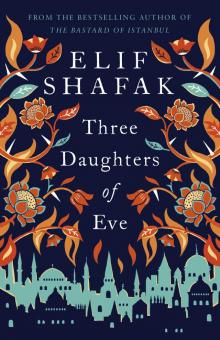 Three Daughters of Eve
Three Daughters of Eve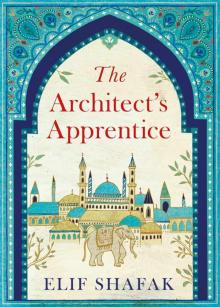 The Architect's Apprentice
The Architect's Apprentice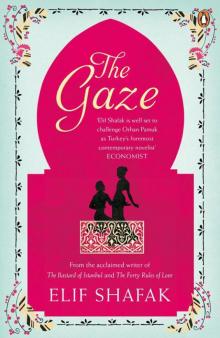 The Gaze
The Gaze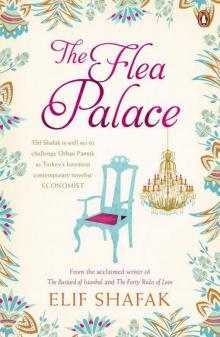 The Flea Palace
The Flea Palace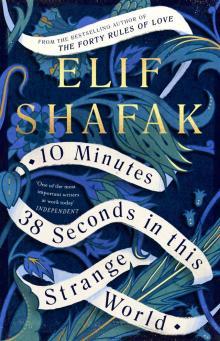 10 Minutes 38 Seconds in this Strange World
10 Minutes 38 Seconds in this Strange World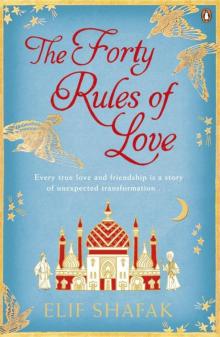 The Forty Rules of Love
The Forty Rules of Love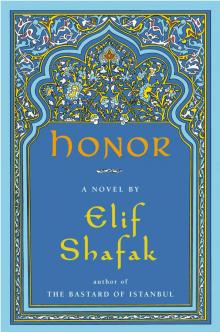 Honor
Honor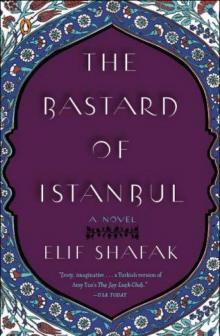 The Bastard of Istanbul
The Bastard of Istanbul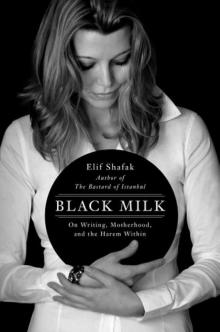 Black Milk
Black Milk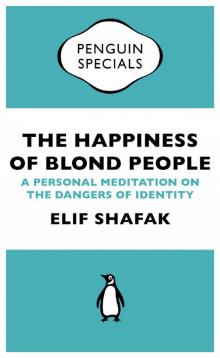 The Happiness of Blond People (Penguin Specials)
The Happiness of Blond People (Penguin Specials)